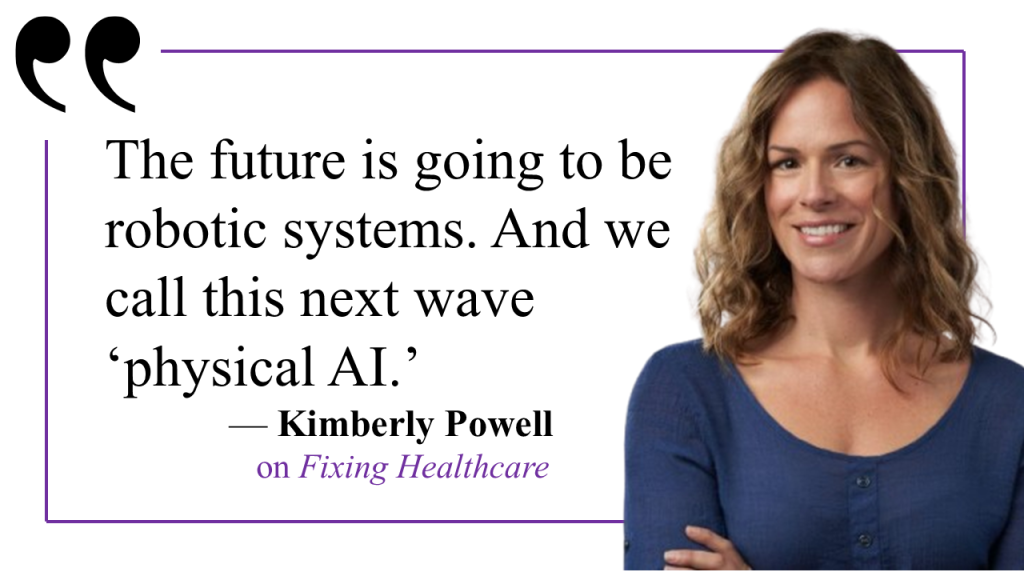Podcast: Play in new window | Download
Subscribe: Spotify | Email | RSS | More
In this latest episode of Fixing Healthcare, hosts Dr. Robert Pearl and Jeremy Corr welcome Kimberly Powell, vice president of healthcare at NVIDIA, to explore how the company’s technologies are reshaping healthcare.
Powell provides a fascinating lens through which to view healthcare’s future, especially as AI begins to play a more prominent role in patient care, diagnostics and clinical decision-making. The interview, part of Season 10’s deep dive into transformative healthcare technologies, kicks off with a question from Pearl: “What are the three technologies that will have the greatest impact on healthcare over the next five to 10 years?”
Here’s what Powell had to say:
1. Accelerated computing
Powell explains how NVIDIA’s GPUs (graphics processing units) have revolutionized data processing, enabling breakthroughs in medical imaging, molecular simulations and AI-driven diagnostics. She highlights how GPUs’ parallel processing power surpasses traditional CPUs, unlocking new possibilities in real-time medical applications.
2. Generative AI
The conversation turns to the explosive growth of generative AI, powered by NVIDIA’s latest technologies. Powell details GenAI’s capacity to handle massive datasets, train neural networks and power applications like ChatGPT and digital health agents. These tools, she notes, will transform everything from clinical documentation to patient monitoring, and in turn will help to reduce clinician burnout, improve patient engagement and drive personalized treatments.
3. Robotics and physical AI
Powell introduces the concept of “physical AI,” where robots equipped with advanced AI capabilities will redefine patient care. Powell highlights how this technology could automate surgical procedures, creating smarter hospital systems and deploying robots that enhance patient care and safety. She paints a picture of a future where AI technology not only optimizes operations but also enhances safety and outcomes.The company hopes to leverage its technologies—from real-time patient monitoring systems and digital avatars for mental health to clinical trial optimization tools—to solve healthcare’s thorniest problems.
A recurring theme in the episode is Powell’s emphasis on the “ecosystem of innovation” NVIDIA has built, fostering partnerships with startups and healthcare institutions worldwide. The company is planning to leverage its technologies—from real-time patient monitoring systems and digital avatars for mental health to clinical trial optimization tools—to solve healthcare’s thorniest problems.
Pearl and Powell also reflect on the implications of generative AI in healthcare, as explored in Pearl’s recent Forbes article, “Nvidia’s AI Bot Outperforms Nurses, Study Finds. Here’s What It Means” and his 2024 book “ChatGPT, MD.” Powell speaks to how NVIDIA’s innovations will complement, rather than replace, human expertise.
Pearl concludes the interview by predicting that generative AI will save hundreds of thousands of lives annually, make healthcare more affordable and alleviate the burnout crisis plaguing clinicians. He sees the triad of a dedicated clinician, an empowered patient and generative AI as the key to unlocking medicine’s full potential, delivering outcomes that far exceed what any one component could achieve alone.
This episode is a must-listen for anyone curious about how technology is reshaping medicine.
* * *
Fixing Healthcare is a co-production of Dr. Robert Pearl and Jeremy Corr. Subscribe to the show via Apple, Spotify, Stitcher or wherever you find podcasts. Join the conversation or suggest a guest by following the show on Twitter and LinkedIn.

